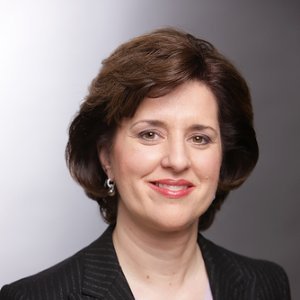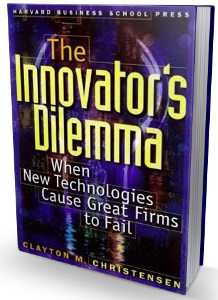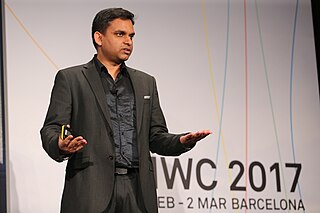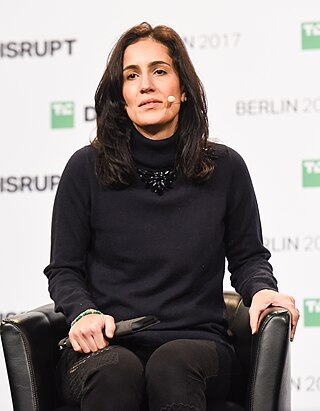Related Research Articles

In business theory, disruptive innovation is innovation that creates a new market and value network or enters at the bottom of an existing market and eventually displaces established market-leading firms, products, and alliances. The term, "disruptive innovation" was popularized by the American academic Clayton Christensen and his collaborators beginning in 1995, but the concept had been previously described in Richard N. Foster's book "Innovation: The Attacker's Advantage" and in the paper Strategic Responses to Technological Threats.

A business model describes how an organization creates, delivers, and captures value, in economic, social, cultural or other contexts. For a business, it describes the specific way in which it conducts itself, spends, and earns money in a way that generates profit. The process of business model construction and modification is also called business model innovation and forms a part of business strategy.

Innovation is the practical implementation of ideas that result in the introduction of new goods or services or improvement in offering goods or services. ISO TC 279 in the standard ISO 56000:2020 defines innovation as "a new or changed entity, realizing or redistributing value". Others have different definitions; a common element in the definitions is a focus on newness, improvement, and spread of ideas or technologies.

Clayton Magleby Christensen was an American academic and business consultant who developed the theory of "disruptive innovation", which has been called the most influential business idea of the early 21st century. Christensen introduced "disruption" in his 1997 book The Innovator's Dilemma, and it led The Economist to term him "the most influential management thinker of his time." He served as the Kim B. Clark Professor of Business Administration at the Harvard Business School (HBS), and was also a leader and writer in the Church of Jesus Christ of Latter-day Saints. He was one of the founders of the Jobs to Be Done development methodology.
Michael E. Raynor is a Canadian writer and an expert on business management practices.
Strategy& is the strategy consulting business unit of PricewaterhouseCoopers (PwC), one of the Big Four professional service firms.

Rita Gunther McGrath is an American strategic management scholar and professor of management at the Columbia Business School. She is known for her work on strategy, innovation, and entrepreneurship, including the development of discovery-driven planning.

Mary T. McDowell is an American technology executive. From 2019-2021, she was CEO of Mitel, a global business communications provider. Prior to that, McDowell was CEO for Polycom from 2016 until its sale to Plantronics in 2018. While at Polycom, she led a strategic pivot to open ecosystems and bought Obihai to strengthen the company’s phone and cloud products. She is on the boards of Autodesk and Informa plc.
Reverse innovation or trickle-up innovation is an innovation seen or used first in the developing world, before spreading to the industrialized world. The term was popularized by Dartmouth professors Vijay Govindarajan and Chris Trimble and General Electric's Jeffrey R. Immelt. Subsequently, Vijay Govindarajan and Chris Trimble published the book Reverse Innovation.
Mark W. Johnson is co-founder and senior partner at Innosight, a growth strategy consulting firm, which he co-founded with Clayton Christensen in 2000.
DueDil is a company intelligence platform covering the SME economy. In August 2021 DueDil merged with Artesian Solutions and subsequently rebranded as FullCircl.

The Innovator's Dilemma: When New Technologies Cause Great Firms to Fail, first published in 1997, is the best-known work of the Harvard professor and businessman Clayton Christensen. It expands on the concept of disruptive technologies, a term he coined in a 1995 article "Disruptive Technologies: Catching the Wave". It describes how large incumbent companies lose market share by listening to their customers and providing what appears to be the highest-value products, but new companies that serve low-value customers with poorly developed technology can improve that technology incrementally until it is good enough to quickly take market share from established business. Christensen recommends that large companies maintain small, nimble divisions that attempt to replicate this phenomenon internally to avoid being blindsided and overtaken by startup competitors.

Shunee Yee Ms. Shunee Yee is the President and CEO of CSOFT International and CSOFT Health Sciences. Responsible for its organic growth from a start-up in a two-bedroom apartment, to becoming an industry leader, Yee oversees CSOFT’s operations across 3 continents.
Creative disruption was introduced in 1992 by TBWA's chairman Jean-Marie Dru. It refers to a radical change in a marketplace brought about by the overturning of existing conventions.
The DO School is a global organization founded in 2014 with offices in Berlin, New York, Hong Kong, and Hamburg. The DO School supports businesses, entrepreneurs, and "young talents".
Fintech, a portmanteau of "financial technology", refers to the application of innovative technologies to products and services in the financial industry. This broad term encompasses a wide array of technological advancements in financial services, including mobile banking, online lending platforms, digital payment systems, robo-advisors, and blockchain-based applications such as cryptocurrencies. Fintech companies include both startups and established technology and financial firms that aim to improve, complement, or replace traditional financial services.

Sangeet Paul Choudary is a business executive, advisor, and best-selling author. He is best known for his work on platform economics and network effects. He is the co-author of the international best-selling book Platform Revolution: How Networked Markets Are Transforming the Economy and How to Make Them Work for You.

Avid Larizadeh-Duggan OBE is an Iranian-French-American entrepreneur and venture capitalist. She is a managing director at Ontario Teachers’ Pension Plan Innovation Platform, EMEA and is a non executive director of Barclays Bank UK.
Soren Marcus Kaplan is an author, consultant, and speaker on the subject of innovation and innovation culture in organizations. He is an Affiliate at the Center for Effective Organizations at the University of Southern California's Marshall School of Business, founder of the consulting firm InnovationPoint, co-founder of the software company Praxie.com, and is a columnist for the Innovate column of Inc. Magazine.
Efosa Ojomo is a Nigerian author, researcher and speaker. He leads the Global Prosperity research group at the Clayton Christensen Institute for Disruptive Innovation, a think tank based in Boston and Silicon Valley and is a senior research fellow at the Harvard Business School. Efosa speaks regularly on innovation and has presented his work at TED, the Aspen Ideas Festival, the World Bank, Harvard, Yale, Oxford and at several other conferences and institutions. In January 2019, Efosa and Harvard Business School professor, Clayton Christensen published "The Prosperity Paradox: How Innovation Can Lift Nations Out of Poverty".
References
- ↑ "Can Big Companies Be Truly Innovative?," by Leslie Kwoh, Wall Street Journal, Aug. 17, 2012
- ↑ "Christensen Inc.," by Daniel McGinn, Newsweek, Nov. 17, 2003
- ↑ "The 50 Most Influential Management Gurus Archived 2013-05-17 at the Wayback Machine ," Harvard Business Review, 2011
- ↑ "Innosight LLC Private Company Information," Investing.businessweek.com
- ↑ "Clay Christensen's Life Lessons," by Bradford Weiners, Bloomberg BusinessWeek, May 3, 2012
- ↑ "Scott Anthony, Innovation’s 'Dr. Disruptive'," by Ira Sager, Bloomberg BusinessWeek, Dec. 20, 2012
- ↑ "Accelerating Innovation In The New Corporate Garage: Innosight," by Steve Denning, Forbes, Dec. 14, 2012
- ↑ "Innosight X | Your Platform for Growth". www.innosightx.com. Retrieved 2018-12-12.